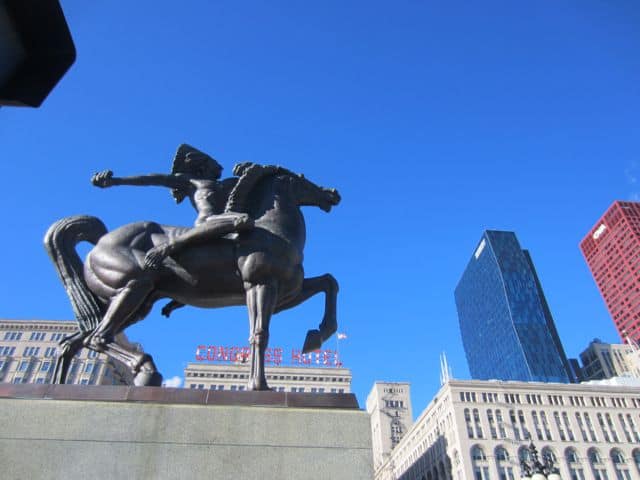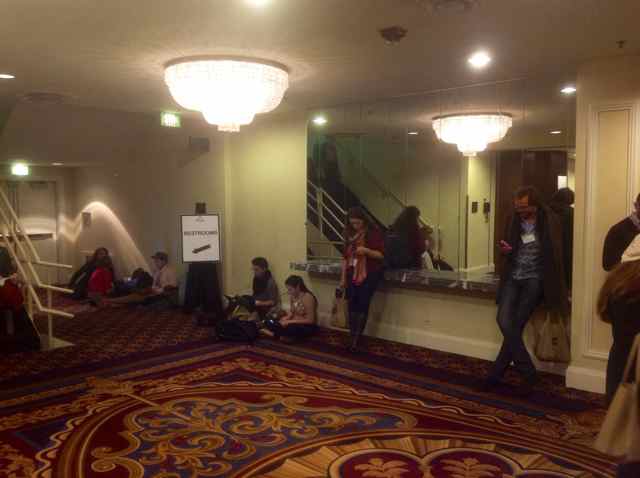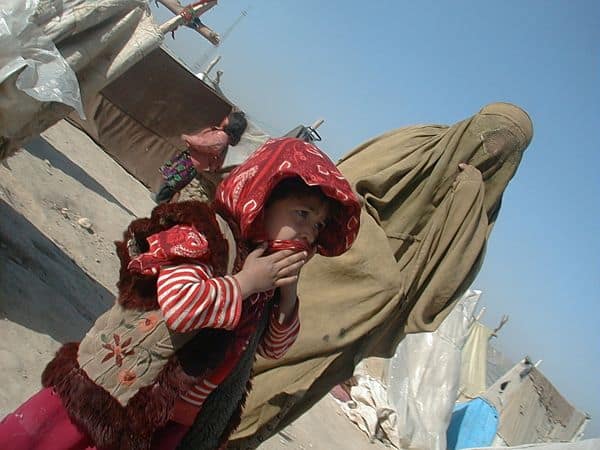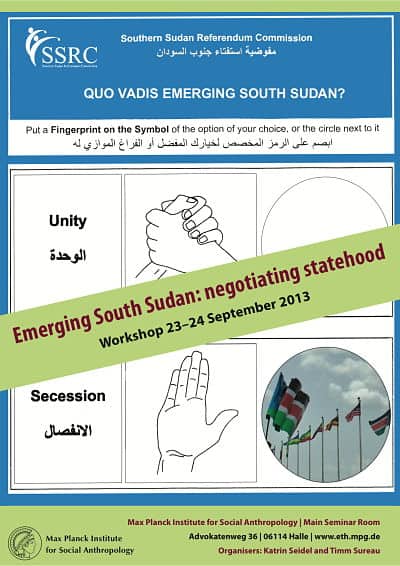After three flights, fifteen hours of travelling, ample soggy sandwiches and three not-too-terrible movies, I finally arrive at the Chicago O’Hara Airport. Some minor arm twisting with the ticket machine (only exact change accepted), frisk pacing up and down the corridors to fix this, and I find myself seated at a local train. Where is it taking me? It is at this point that I realise that I have, once again, forgotten to write down the exact address of my end destination. Yet this doesn’t worry me terribly as finding my way can’t be too difficult. For I am not going just ‘wherever‘, but rather, to a Place – a definite landmark of the Chicago landscape: The Hilton!
I have checked out the hotel online in advance, and found myself feeling somewhat intimidated by all the pictures of glory and glitter – the chandeliers, the shiny floors, the flashy flower arrangements, not to mention the unobstructed view of the lake Michigan. Is this really what the ‘anthropological scene’ looks like in the ‘New World’?!
With slight trepidation I exit my cab (turns out, the local train wasn’t as convenient as my optimism had warranted me), and approach the hotel. Now being faced with the full majestic force of this gigantic building I cannot help but feel like a poor country cousin who has come to the big city to visit family living ‘on the fast lane’. I glance at the people passing through the revolving doors, eying their ‘gear’. I have studied carefully ‘the anthropologists’ guide to conference chic‘, but somehow my outfit still feels wrong. Oh well, there’s no turning back now.
Here goes nothing, I think, and seize my turn at the revolver. 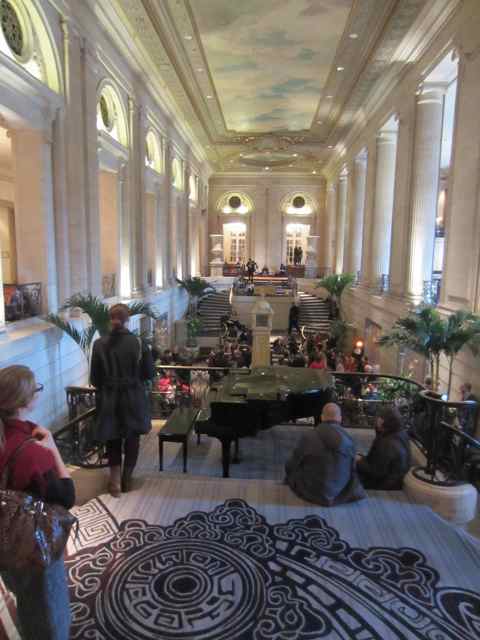 Nothing could have prepared me for what follows, for it feels as if the doorway functions like a portal to a parallel universe. I first notice it by a sense of speed, through an odd feeling that I am somehow out of synch with the surrounding reality.
Nothing could have prepared me for what follows, for it feels as if the doorway functions like a portal to a parallel universe. I first notice it by a sense of speed, through an odd feeling that I am somehow out of synch with the surrounding reality.
As I try to navigate my way through the crowded lobby, I start to bizarrely feel that everyone else is moving twice as fast as I am. What only a moment earlier felt like a perfectly normal pace of walking now comes across as something from a slow-motioned film. People everywhere, faces everywhere, talk talk talk – greetings, smiles, steps coming and going, people approaching me only to pass me by a mere second later.
It is as if I am caught in ‘The Matrix’ with bullets zooming by, except that instead of being able to move faster than them, I am merely frozen to my spot, only capable of observing what unfolds around me.Realizing that this feeling may in part be due to jet lag, I fight off the impulse to race straight back onto the street, and remain determined to make my way to the check-in. Tons of more people, everywhere, a cacophony of sounds, do I recognise anyone, I don’t think so. I retrieve my key – good, at least my room is in order – and head toward the elevators. Which floor am I on again?
And then everything stops. For the elevator does not come. And still it does not come. It is only by day three that I realise that this is a distinct accompaniment of my conference experience: for all the glory of the hotel, its elevators sure do – apologies for this vulgar expression – suck! Or maybe it is merely inevitable, the hotel being the site of thousands of anthropologists, all desperate to make their way up and down as they navigate between their rooms, breakfasts, lunches and dinners – and, oh yeah, ample sessions along the way.
The Annual Meeting of the American Anthropological Association, the ‘AAA’, is the undoubted highlight of the anthropological social calendar. Year after year it attracts anthropologists from all over the world to its changing localities (San Francisco, Washington DC; San Francisco, Chicago, Washington DC..). Or rather, those who have the means to participate as, let’s face it, this isn’t exactly cheap! Those who are fortunate to have an institution to cover their expenses may find the financial side of things an insignificant detail too ‘common’ for discussion, but for anyone covering the bill by themselves the same definitely does not apply.First, the annual registration fee to the Association – a crisp few hundred – then conference registration – a few more – then travel costs – ca-tshing – and finally, all costs of room and board at the HIlton – ding-ding-ding!
Someone certainly is making a profit over our shared desire to convene. And with varying news claiming that up to 75% of all US university staff is currently on adjunct contracts, these huge expenses involved cannot but come across as increasing the inequality between permanent and temporary staff even further.
During the following five conference days ‘Big Stars’, ‘Rising Stars’ and all the others peeking from the shadows compete for moments in the spotlight. The
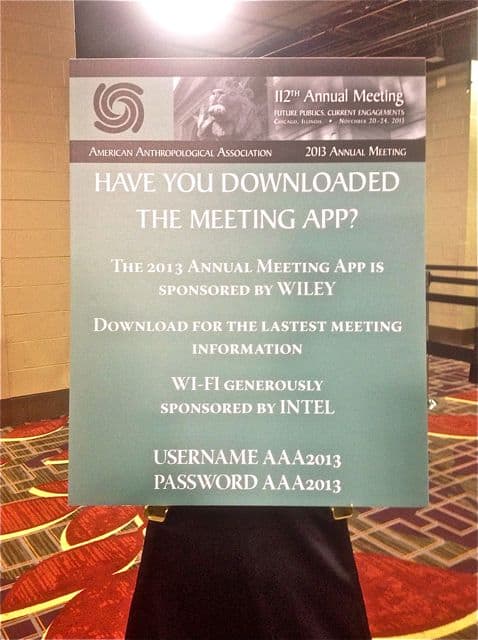 conference program feels never-ending and every session sounds more cutting-edge and snappy than the previous one. Which panels and papers will become ‘the talk’ of the conference; just who is in synch with ‘the feel’ this year – (proclaimed by Savage Minds in 2013 as being ‘the ontological’ turn?!) With all this massive energy zooming around, it feels incredibly difficult to concentrate on anything.
conference program feels never-ending and every session sounds more cutting-edge and snappy than the previous one. Which panels and papers will become ‘the talk’ of the conference; just who is in synch with ‘the feel’ this year – (proclaimed by Savage Minds in 2013 as being ‘the ontological’ turn?!) With all this massive energy zooming around, it feels incredibly difficult to concentrate on anything.
I watch how in the corridors participants dressed in the last anthropological chic rush from one room the next, their eyes riveted on their smart phones, going over panel abstracts or the last tweeter updates (due to generous sponsors, the conference offers complementary wi-fi; who still argues anthropologists are not riding the ‘digital wave’?!). I wonder if I am witnessing lacking concentration in action, or whether their skills to focus simply surpass mine.
For this particular ‘European savage’, something comes across as a bit odd in all of the above. To begin with, it feels slightly surreal to be in a luxury hotel for a conference. My mind is clouded with bizarre ‘European’ ideals – whatever happened to the notion of scholarship belonging to ‘the public’; as having its home in the ‘public sphere’? Where is the ‘outside’ here, even the imagined kind? What is the AAA fundamentally about; who and what is it for? What is/are the subtext(s) of the meeting? Is it really a huge ‘factory’ of knowledge production? A market place for recent PhD graduates? A place for meeting old friends; a fashion show?
Like any proper anthropologists, I am conscious that if I am to understand the varied layers of this experience (or simply to survive), I need to blend in. As step one toward realising this goal I download the AAA app on my tablet. Now confident that I will not to get lost in the hallways of this ostentatious palace, I head for my first panel the obscure title of which sounds promising.
The room is filled to the brim with an attentive audience and brilliant minds who deliver brilliant papers, perfectly calibrated to the 20 minutes time slot. Each paper is accompanied with complicated power points which perfectly illustrate their words, with no one struggling with the technical equipment, or stuttering the usual disclaimers – ‘oh no, I just got started and I am already out of time; I guess I’ll just skip this part, and this, and …’ Each paper comes across like a perfect ‘Coke’, served at the perfect temperature: I can feel the sugar boost after each sip but feel thirsty immediately afterwards.
This experience resembles the one that Slavoj Zizek describes in a scene of a Pervert’s Guide to Ideology. In the scene he walks alone in a deserted landscape with a bottle of Coke in his hand, a metaphor he uses to illustrate the “passage from sublime to excremental: when it (Coke) is cold, properly served, it has a certain attraction…and all of a sudden, it can change into shit. It is the elementary dialectic of commodity.” (Watch clip here)
The talk machine is now in full speed and nothing can stop the smooth and uninterrupted flow of words. The session concludes with equally brilliant comments from the discussant, after which the audience starts to shift restlessly as they prepare for take-off. It is only at this point that I realise that the session has come to its end, with no discussion of any kind to accompany the papers. In a blink of an eye everyone is gone, rushing toward the next panel composed of equally brilliant minds and papers. I am left alone in the magnificent room upholstered with crystal chandeliers and frescos. My head is spinning. What were these past two hours about? I feel terribly thirsty.
Jetlagged and slightly distraught, I continue toward the next item on my conference agenda: meetings. This, I have learned, is the second (or first?) order of business at the AAA – network, mingle, meet people, create alliances. On my meeting calendar are both old and new acquaintances; people of passing collaboration as well as those with whom I have corresponded for much longer but never met in person. My first meeting is of the latter kind, and further it being with an editor of a rather important forthcoming publication of mine, I am both nervous and enthusiastic of what shall be.
Searching for just the right combination of ‘witt’ and ‘ingenious’ in my disoriented brain, I make an excited entrance. The meeting begins well enough, with the appropriate gushing over my work which sends me momentarily floating in mid-air. Yet I am soon jerked back to good old Mother Tellus by my accompanion’s rather disheartening comment: “it’s a shame that no one buys books any more!”
It is somewhere in between this statement and the excitement that my accompaniment expresses at – what feels like – every other person passing by that my feeling of being ‘special’ begins to rub off. I realise that the ‘meeting’ I have so long-awaited – accompanied by the thought that after all these years of correspondence this would provide an actual opportunity to sit down and discuss my work – is merely one in the ‘production line’ of similar meetings with all the authors my editor is in charge of.
Each meeting is, of course, perfectly timed: 15 minutes.
Somehow all of these realisations combined result in what can only be described as an ‘overload’ – it exerts a cocktail that becomes simply too much for my ‘savage European’ brain to process. I find myself at a loss for words, with the consequence that the meeting which (I by now realise), should be filled with light chit-chat, audible laughter and effortless self-promotation toward my next book contract, is transformed into one consisting of – gush – awkward silences.
In my desperation of finding all of my social skills failing me, I start experiencing true out-of-body sensations. I see myself from across the room with an identical frozen smile plastered on my face as all others present, struggling to find anything intelligent to say. And yet it gets worse. Perhaps in an effort to fill the ‘dead air’ in between us, my accompaniment starts to introduce me to people passing by, first one, then another, then a third. The last person expresses overwhelming enthusiasm over my forthcoming book, gesticulating his hands wildly in the air as if in physical extension for his enthusiasm.
Somehow in this desperate moment the movement of his hands functions as hypnotism, and causes my brain to get all the involved social signals mixed: I misread his waiving as suggesting a forthcoming handshake. Thus, as if caught in ‘The Matrix’ once more, I see myself raising my hands and leaping forward, I watch myself grabbing his hands from mid-air, and finally giving his hands a good, thorough shake. Realizing too late what a gigantic social fallacy I have just committed, I continue my out-of body experience as I witness the nervous laughter that my embarrassed interlocutor bursts into.
Having no means to force the earth to swallow me at this very moment, I attempt the next best thing by laughing stupidly along. As I a moment later exit the meeting, I realise that my conduct may not have left me favourably displaced toward getting my next book contract. Thus I figure it might be best to seek some career advice. Fortunately I recall having seen signs for the ‘Career Center’ upon registering for the conference, and I decide to pay a visit.
The Centre greets me with a large board filled with job announcements. I quickly learn that the ones attached with yellow pins still accept CVs whereas the calls for the other positions are already closed – with my brain still in ‘overload’, I feel grateful for these clear instructions. Around me smartly dressed candidates are seated at round tables, waiting for their turn to be interviewed. I see one young scholar rehearsing the speech he reads from his computer screen, anxiously clutching his hands above his keyboard.
At a nearby table, one candidate complains: “I wish that this was like an online dating site – either you match or you don’t.”
Feeling this statement as a  welcome for further exchanges, I nod sympathetically, and then ask another candidate: “In the interviews, do they really stick to the 20 minutes?” “Yes they do,” he answers. I find myself acquiring a new-found understanding for the fluency of the 20-minute presentation of panel papers: this is a slot that US scholars clearly have to learn to conform with early on in their career. In this vast machine of knowledge production – be it the AAA or university hiring – you only have one pre-determined slot available for you, and you either make it in this time or you don’t.
welcome for further exchanges, I nod sympathetically, and then ask another candidate: “In the interviews, do they really stick to the 20 minutes?” “Yes they do,” he answers. I find myself acquiring a new-found understanding for the fluency of the 20-minute presentation of panel papers: this is a slot that US scholars clearly have to learn to conform with early on in their career. In this vast machine of knowledge production – be it the AAA or university hiring – you only have one pre-determined slot available for you, and you either make it in this time or you don’t.
But what can really be done in 20 minutes from a scholarly perspective? In the case of interviews I really think that it boils down to one thing: your presence. How well you are able to summarise yourself, and how you perform under such situations of pressure. Skills some scholars have, some don’t – but certainly not skills that are synonyms for intellectual brilliance.
And I cannot help but think that this idea of ‘the slot’ is further responsible for the ‘slogan scholarship’ of which we see so much around us: in order to make it as a scholar these days, you have to do well in citation indexes, and to do that, you have to come up with that catchy quote (preferably a book title) which fits nicely in a reference. Is this really all there is to ‘making it’ as an academic these days? I do not find this a comforting thought.
I start to feel that I may have outstayed my welcome at the career centre – let’s face it, this is not the scene for the ‘European Savage’! – but I dare to push it with one more question. “How was your interview?” I ask around at the young scholars around me, justifying this to myself by the argument that I am here trying to understand the AAA ritual. A bearded young man in suit approaches my table. He tells that his postdoc is coming to an end and he is now looking for a permanent position. His interview went well, even if it is difficult to judge: interviewers do not let their expression betray anything. He has invested hundreds of dollars in the conference registration fees, his hotel room and a flight ticket just to be here: “where things are taking place”.
My astonishment at the idea that one has to pay in order to find a job does not impress him much. “You see, I don’t really see it this way. That’s part of the things you have to do if you want to become an academic”. The other candidates agree: “We have invested so much in our studies, so a few hundred dollars more to give ourselves a chance are not that a big deal”. Six hundred dollars for a twenty minutes interview: the price seems high to me when you have to compete against hundred of other candidates…and when you know that passing this test only allows you to attend a second full day interview, on campus this time.
I find myself, ironically, thinking how in uncanny ways the ‘AAA machine’ resembles the UN: it is a hope-generating machine for adjuncts and PhD graduates in search of stability. And like any other machine, it both includes and excludes.
To be included requires enormous capital – it is no news that all the sums involved in US education are astronomical when compared to the European context. The full irony of distinctions into insiders and outsiders of the AAA machine opens up to me at the last day of my conference experience. By this time my head is spinning with all the experiences of the past days: all the brilliant panels I attended, all the brilliant papers I listened to, the brilliant paper I (dare I say it?) delivered myself in the brilliant panel I run, the informal meetings, the breakfasts, lunches and dinners – and not the least the ‘TweetUp’ in which I learned how all this looks in the social media (I have to admit that I was surprised to learn how many people apparently have taken on the habit of tweeting updates DURING panels!).
Also, by this time I am really, really tired of waiting. For the elevators still never show up. I have learned that they pass you by, or that you have to catch them going in any direction regardless of where yourself are heading. Enough of this, I say to myself after one final pointless wait: damn it – I have legs! And with that I take the stairs.
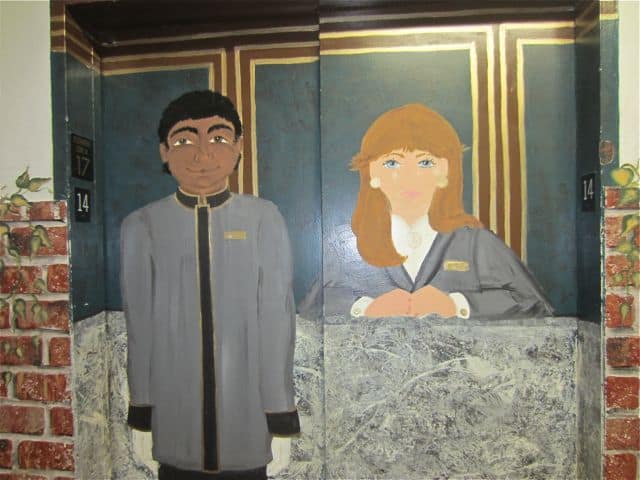 Suddenly I feel as if I am jerked to a third parallel universe which has been there all along, both so close yet so far; invisible to my ignorant eyes. Yes, I have found myself wondering at the lack of actual racial diversity among conference participants, and felt a bit uneasy at the predominantly white folks walking around as if carrying invisible backpacks which they momentarily unpack for others. “I’m studying the xxx tribe of Africa/South America/South-East Asia/Indigenous peoples, their marriage customs, their kinship structures, and here is my latest book – what do you have in your backpack”; with the exchange then being repeated in the reverse.
Suddenly I feel as if I am jerked to a third parallel universe which has been there all along, both so close yet so far; invisible to my ignorant eyes. Yes, I have found myself wondering at the lack of actual racial diversity among conference participants, and felt a bit uneasy at the predominantly white folks walking around as if carrying invisible backpacks which they momentarily unpack for others. “I’m studying the xxx tribe of Africa/South America/South-East Asia/Indigenous peoples, their marriage customs, their kinship structures, and here is my latest book – what do you have in your backpack”; with the exchange then being repeated in the reverse.
Yes, I had realised that most of the ladies pushing the cleaning carts and tending to hotel rooms were of colour or hispanic, as were the people opening doors and ordering us ‘conference folks’ taxies (and then in the lobby there was also the stand for the gentlemen who polish shoes – yes, you guessed right both the race of the gentlemen doing this labor as well as the race of the anthropologists having their shoes polished; and I don’t even want to get started with …, contributor of Savage Minds, being mistaken for service staff for the panel she ran!). But I had not realised that this division of labor was actually embodied at the hotel itself, namely in the form of murals painted on elevator doors on the ‘service’ side of the Hilton.
I discovered this as, after heading for the stairs, I arrived at the floor which was clearly the centre for the service staff at the hotel. There, right in front of my eyes, I could see a painting of a white, blond-haired lady smiling at the reception, with a painting of a black lady pushing the cleaning cart along with paintings of black gentlemen being portrayed in equally ‘race-appropriate’ endeavours.
The mere embarrassment of being a participant at an ANTHROPOLOGICAL event organised at a venue of such embodied racial inequality certainly gave my feet the extra little ‘something’ to make the dozen floors down feel like nothing. I cannot help but feel that the irony for our discipline is that the first exclusion is that of ‘diversity’…a diversity that can only be found in the backstairs of the Hilton, where the black and Latino employees silently navigate the floors to serve the ones of us who, at other times, study their folks all over the world.
It is not easy to end my reflections of the AAA 2013 on a positive note in the face of such dark undercurrents, but laughter being the best medicine and the  most creative way of resistance I shall try nevertheless. So in sum, what did I learn? That the AAA is an impressive ‘talk machine’ – a fast train that keeps on going to its final destinations whether you’re aboard or not – and it is much better be aboard (= prepare well for your 20 minute slot cause that’s all you’re gonna get!)!
most creative way of resistance I shall try nevertheless. So in sum, what did I learn? That the AAA is an impressive ‘talk machine’ – a fast train that keeps on going to its final destinations whether you’re aboard or not – and it is much better be aboard (= prepare well for your 20 minute slot cause that’s all you’re gonna get!)!
And further, that to qualify as a proper American anthropologist, you have to A) move around REALLY fast, talk REALLY loud and laugh EVEN LOUDER; B) know how to introduce yourself (aka full name, institutional affiliation AND the content of your ‘backpack’) in 15 seconds or under; C) be hyper-excited about everything, even when you haven’t the slightest idea of what the other person is talking about. Thank you AAA 2013 for all this and more! (And dear American colleagues: we look forward to your observations of ‘us’ at the Bi-Annual meeting of the European Association of Social Anthropology in summer 2014! Also, we are just getting started with the ‘rest of the world’!)

